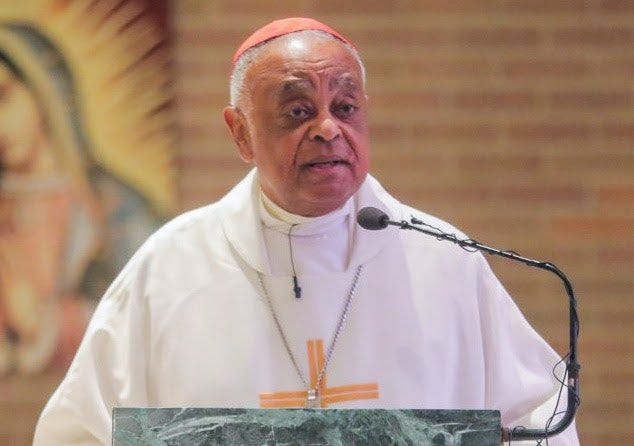
When Cardinal Wilton Gregory spoke at the National Press Club Wednesday, it was inevitable that he would be asked about the clerical sexual abuse scandal, and about a former Archbishop of Washington, Theodore McCarrick.
When Gregory got those questions, he talked about the Charter for the Protection of Children and Young People, about the Church’s “zero tolerance” approach to accused clerics in ministry, and about priests who have “provided extraordinary pastoral service,” and are cast under a dark shadow because of the relative few who have committed abuse.
Clerical sexual abuse is “absolutely contrary to everything that I as a priest, my brother priests and bishops, should be pursuing, in terms of serving of our people,” Gregory said.
Perhaps surprisingly, the cardinal also talked about vicarious liability. He explained that bishops should not be held accountable for assigning abusive priests to ministry if they had no way of knowing about the acts of abuse or misconduct.
Gregory was direct on that issue: “I can only act on that which I know. And I do it clearly, honestly, straightforwardly, and I continue to do it.”
Amid his remarks, the cardinal expressed empathy for Catholics who were hurt by the abuse, coercion, and manipulation of McCarrick.
“When I’ve seen images of Theodore McCarrick, whether recently as he pled not guilty, or early on, when this whole sorrowful event occurred, my first thought was about the people that he’d hurt,” he said.
“One of the things that we’re trying to do, and we still have to make sure that we’re doing it effectively, is we’re trying to make sure that the proper attention is put in the proper place — the people who should get our sorrow, and our concern, and our compassion, are those that were hurt.”
He added that institutional self-protection has been a mistake from the Church.
“From the beginning of this crisis, we began to focus on the wrong entry point — we began to focus on how should the Church be protected.”
Gregory expressed acute understanding and empathy for Catholics who have lost trust in the Church, and in their leaders, because of the scandal of abuse and cover-up.
“No parish should sit there, and look at the priest who is celebrating Mass, and say ‘I wonder if this guy has got a problem,’” he said.
The cardinal’s comments were of a piece with the tone of empathy and institutional contrition he has struck since he was appointed Washington’s archbishop in April 2019. While many Catholics have expressed gratitude for that disposition, some have been more critical, wondering if that empathy will translate to transparency.
As Gregory noted, in the wake of the McCarrick scandal, trust in Church’s institutional leadership has diminished in the United States, especially as some Catholics ask whether bishops presently in leadership positions might have enabled, tolerated, or ignored McCarrick’s years of coercion and abuse.
That erosion of trust has, indeed, left some wondering if the priest celebrating Mass, or the bishop offering confirmation, has “got a problem.”
Like Gregory, those Catholics, for better or worse, “can only act on that which [they] know.”
Gregory is positioned to know more than most. As Washington’s archbishop, he has access to the financial records which track McCarrick’s mostly unmonitored and discretionary archdiocesan accounts — the accounts from which McCarrick is known to have written large checks to fellow bishops, a practice which has become widely known in the wake of his scandal.
The complete financial records are believed to indicate the extent to which Church officials could have been encouraged by McCarrick’s largesse to look the other way on the former cardinal’s misdeeds.
They also might indicate whether the former cardinal was offering financial support to victims, and whether Church officials might have known about it.
It’s also possible those accounts offer no conclusive indication that bishops and other ecclesiastical officials were looking the other way, and possible that McCarrick wrote few checks to bishops currently in ministry. And Church officials say McCarrick’s gift-giving must be looked at in the context of a culture in which that sort of thing was, until recently, commonplace. That may well be true.
But because the records have not been released to the public, few know what story they might tell, regardless of the context.
With McCarrick in the news again, and facing the prospect of a trial that might reveal a broader swath of allegations against him, Gregory might again face pressure to release the financial records in possession of the Washington archdiocese. To date, he has given no indication that he plans to do so — even after the Vatican’s 2020 report on McCarrick was criticized for a seemingly studied incuriosity about dollars and cents.
Whatever they reveal, the records might help answer the lingering questions of Catholics struggling to trust. And their release itself might help quell simmering criticisms about Gregory’s own commitment to transparency. But until they are released, Gregory is almost certain to continue facing questions about them — not at the National Press Club, perhaps, but from the Catholics to whom he has promised to be truthful.
Some of those Catholics may well want to make new acts of trust in their bishops, to see clerics come out from under the shadow of McCarrick. But as Cardinal Gregory put it Wednesday, those Catholics can only act on what they know.







I pray the Pillar, our last beacon of hope in the press, co to yes to press for transparency on this issue.
I pray the Pillar, our last beacon of hope in the press, co to yes to press for transparency on this issue.